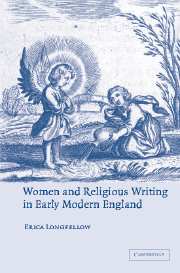Book contents
- Frontmatter
- Contents
- Acknowledgements
- Abbreviations
- Note on transcription and citation
- Introduction
- 1 ‘Blockish Adams’ on mystical marriage
- 2 Ecce homo: the spectacle of Christ's passion in Salve deus rex judæorum
- 3 Serpents and doves: Lady Anne Southwell and the new Adam
- 4 Public worship and private thanks in Eliza's babes
- 5 Anna Trapnel ‘sings of her Lover’
- 6 The transfiguration of Colonel Hutchinson in Lucy Hutchinson's elegies
- Conclusion
- Bibliography
- Index
- Index to scripture passages
4 - Public worship and private thanks in Eliza's babes
Published online by Cambridge University Press: 22 September 2009
- Frontmatter
- Contents
- Acknowledgements
- Abbreviations
- Note on transcription and citation
- Introduction
- 1 ‘Blockish Adams’ on mystical marriage
- 2 Ecce homo: the spectacle of Christ's passion in Salve deus rex judæorum
- 3 Serpents and doves: Lady Anne Southwell and the new Adam
- 4 Public worship and private thanks in Eliza's babes
- 5 Anna Trapnel ‘sings of her Lover’
- 6 The transfiguration of Colonel Hutchinson in Lucy Hutchinson's elegies
- Conclusion
- Bibliography
- Index
- Index to scripture passages
Summary
On 25 July 1652, George Thomason, owner of a collection of tracts now in the British Library, purchased a slim duodecimo volume titled Eliza's babes: or, the virgins-offering. Like The countess of lincolns nurserie (1622), Eliza's babes is often mistaken for a children's book; but in fact the ‘babes’ are poems and prose meditations, brought forth through the ‘marriage’ of the author to Christ. ‘Looke on these Babes as none of mine’, she cautions in the prefatory poem ‘to my sisters’:
For they were but brought forth by me;
But look on them, as they are Divine,
Proceeding from Divinity[.]
As even that brief epigraph suggests, the metaphor of marriage to Christ serves as a primary vehicle of poetic authority in this small but remarkable volume. It consists of ninety-five devotional poems (seventeen of four lines or shorter) followed by thirty-two prose meditations (ranging in length from a few lines to a few pages) and closed by a statement beginning ‘Wings my Doves you have now obtain'd’ that is obviously derivative of Herbert's ‘Easter Wings’. The mere existence of such a printed collection of devotions from a woman not associated with a radical sect is unusual in itself. Even more exciting for scholars of early modern women is the controlling presence of marriage and birth metaphors that justify the author's ‘publique thankes’, as she calls the act of sending her ‘babes’ out into the world.
- Type
- Chapter
- Information
- Women and Religious Writing in Early Modern England , pp. 122 - 148Publisher: Cambridge University PressPrint publication year: 2004



